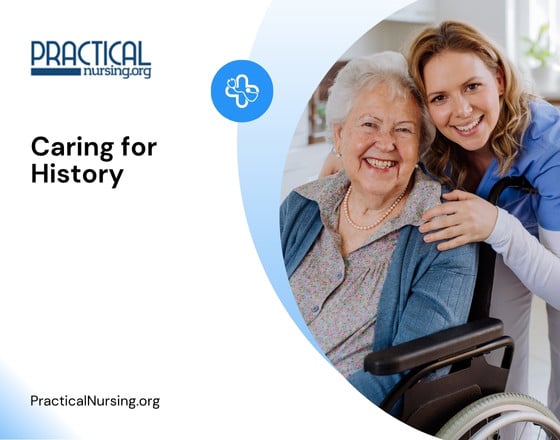Caring for History


 “To care for those who once cared for us is one of the highest honors.”
“To care for those who once cared for us is one of the highest honors.”
― Tia Walker, The Inspired Caregiver: Finding Joy While Caring for Those You Love
Almost everyone I knew in LPN school hated the geriatric/nursing home clinical rotation.
“It’s boring!”
“It’s all the same.”
“It’s like dealing with a grown up baby!”
“I am not going to school just to change adult diapers.”
For me? It felt like home.
I grew up in nursing homes. No, seriously, I did. My mother worked as a CNA, and my aunt was an LPN. They’d usually trade me off while one worked and one was off, and I’d spend time with my books. I’ve always been fond of stories. As a little girl, I would constantly bury my nose in a book and hide away, instead of seeking out others for schoolyard games such as tag and hide and seek. To me, the words on the page were always more interesting than running around in circles, chasing my friends with no clear goal in mind other than to be chased in return. I especially loved history. It always fascinated me to read others’ stories during events like the World Wars – to read how they survived the daily struggles during the time, their views, and their reasons for fighting. It made my day when something would happen and my aunt or my mom would be late picking me up. I’d get to visit with the elderly residents they cared for. I’d spend hours with those residents, hearing their tales of the Great Depression, how they grew up on a farm, how hard it was just to make ends meet. They’d tell me stories from their childhoods, laughing and smiling as they did. Sometimes, they’d even turn it into a little bragging competition.
“I had twenty cows to milk before sunrise!” one would say.
“Oh yeah? Well, I had twenty-two cows! And three goats! And I was the eldest so I always had to do the milkin’!” Another would retort with a smug laugh.
On and on they’d go, trying to outdo the others until it was either activity time or snack time. The competition would be forgotten until next time. Some had family that lived several states away and only visited during the holidays. Some? Some had no family at all. But it never failed. Each week, either my mother or my aunt would be late, and I’d spend the better part of my day just sitting next to their wheelchairs or in their laps as they dived into their childhood memories and relived a few happy moments.
As I grew older, I still visited. These residents became family in a way. They watched me grow up, and as I grew, I watched them grow as well. One came out of her shell completely. We would do Sunday school puzzles and color together while she sang hymns she used to sing as a little girl. Every Sunday, she’d meet me at the front lounge, a new coloring page and puzzle waiting for us to do. One taught me how to knit. However, like all children, I entered high school and became swamped with college level classes, honors classes, and had family illness to help care for. I stopped visiting my friends, but I never forgot them or their stories.
When I turned nineteen, I became a CNA. I was fortunate enough to get a job at the same nursing home I knew so well as a child. On my third day there, the residents recognized me. They asked where I had been, how was school? How was I? It was like coming home to a family reunion and seeing everyone after a long absence. It was story time all over again, except this time, it was my turn to tell the stories.
Looking back on everything, I know without a doubt I couldn’t work in any other field but geriatrics. I could, but I wouldn’t be happy. Geriatric nursing isn’t a field for everyone. Everyone wants excitement – ICU, trauma, CCU. To me, geriatrics is a great nursing specialty. You learn more about the world – how it’s changed and how it hasn’t. You get first hand tales of lives from another time period. You also gain a family. These residents aren’t just residents – they become family. When they achieve something, whether it’s managing to feed themselves after a stroke or making it to the bathroom on time without an accident, those victories become your victories and you brag on them, congratulate them, beaming with pride. Their pride becomes yours. When they become sick, you worry. When they’re passing, you make sure to hold their hand and let them know it’s okay and they’re not alone, and when their story finally comes to a close, you cry because deep down, you know they loved you and you loved them too.
RELATED – Yes, LPN’s Can Work Somewhere Other Than a Nursing Home
I chose geriatrics because I love people, I love history, and I love stories. In a way, the elderly are living history books. They may have “dusty” covers, but inside? The pages are filled with amazing stories. It takes a special kind of person to be willing to sit down and read those pages, to tough it out through the hard chapters, the boring chapters, and the sad chapters, but the stories inside each resident are worth the effort.
Learn more about the various specialties and LPN careers.
Related Articles
- Most Affordable LPN/LVN Programs for 2026: Your Path to Nursing Success on a Budget
- LPN / LVN History & Background
- LPN to RN Bridge Programs: Accelerating Career Growth for Practical Nurses
- You Will ALWAYS Be Learning!
- Nursing in Long Term Care
- Full Time Mother and LPN
- Culture of LPNs and RNs in Team Nursing
- How to Prepare for Your LPN/LVN Program Entrance Exam